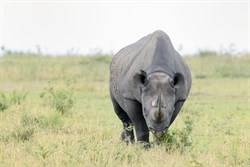
On 8 and 9 April 2014, wildlife trade experts, field biologists, academics, tourism experts, conservationists and economists will gather in Pretoria to discuss the issue.
In the face of a 7,000% increase in rhino poaching since 2007, the South African government is preparing to ask the international community to approve the legalisation of rhino horn trade. This is one of the most contentious subjects in wildlife conservation today - does trade save species or does it endanger them?
"The government - and some South Africans - believe that by legalising trade and exporting rhino horn to the markets of east Asia, they can not only meet demand and reduce poaching but can also generate resources for rhino protection," said Allison Thomson, founder OSCAP. "Opponents argue that this controversial strategy could accelerate poaching, pointing to the massive slaughter of elephants that has occurred since China was permitted to buy southern African ivory stocks legally."
As a prime destination for wildlife tourism, a conservation leader in Africa, and an economic power-house for the continent, what happens to the rhino matters to South Africa and its people. OSCAP is holding this conference in advance of the country's 2014 general election so that all prospective parliamentary candidates have the opportunity to declare their position on a matter of national and international significance.
"I believe that speculation on a potential future legal trade in rhino horn will increase the threat to our rhinos," said Thomson. "I hope that this conference - and the public debate that it ignites - will assist policy-makers to end any speculation about legalising rhino horn trade and prompt them to decide against submitting a proposal for trade to the Conference of the Parties to the Convention on International Trade in Endangered Species (CITES) which South Africa is hosting in 2016."
Registration for the conference can be completed at www.oscap.co.za and details of the conference can be found at www.oscapconference.co.za.